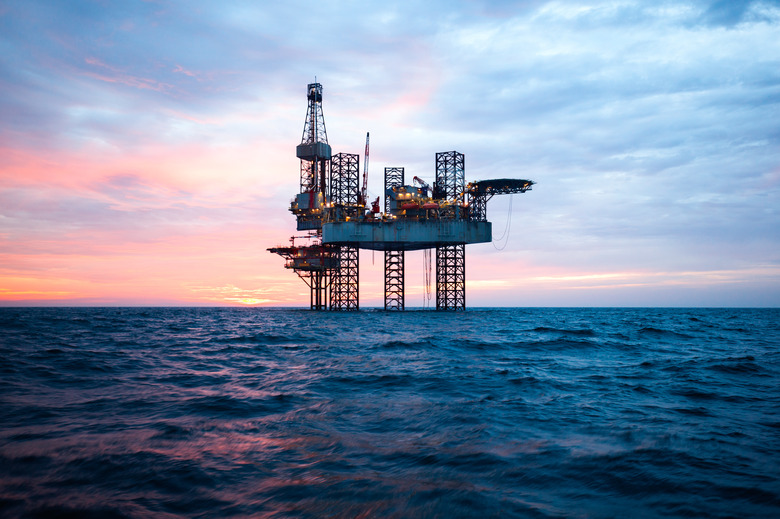Oil Drilling Benefits
Crude oil, extracted from the ground in various parts of the world, is one of the most valuable resources in the modern world: as the base form of petroleum, it powers cars, ships and planes and also acts as a raw material resource found in everything from DVDs and shampoo to perfume and artificial limbs. Oil companies extract the oil from the ground by drilling for it; a controversial topic with many noted negatives – and a number of rarely discussed benefits. As long as companies drill for oil carefully and mindfully, oil well drilling offers benefits for both the global economy and the global environment.
TL;DR (Too Long; Didn't Read)
Crude oil, once refined into petroleum, offers an incredible energy source as well as a component in a wide variety of household goods and useful items. The drilling process adds jobs and benefits the global economy, and it can _also_ benefit the atmosphere and aquatic environment by reducing the seepage of hydrocarbons into the oceans. But these benefits do not come without the risk of accidents and oil spills during the drilling process – which is why regulation and monitoring of drilling operations are critical.
Oil: A Universal Resource
Oil:
A Universal Resource
Crude oil extracted from the earth is useful, but not in its raw form. It requires a refinement process that makes usable petroleum products utilized around the world. Everything from clothing to mechanical parts, furniture, cosmetics and medicine come from petroleum products – all in addition to the gasoline and jet fuel that power modern forms of transportation.
Economic Benefits
Economic
Benefits
The process of extracting, refining and using the by-products of crude oil requires hundreds, if not thousands of people: the industry built around oil drilling and oil itself creates jobs in a wide number of industries including shipping and transportation as well as medical research – the immediate benefit of oil drilling comes in the form of job creation and economic boosts. Oil drilling in Russia, for example, created a new middle class, and if the United States increased oil drilling operations in Alaska there would be both an _increase_ in the number of available jobs and a _decrease_ in domestic energy costs, as the country would need to import less oil from foreign drilling sites.
Environmental Benefits
Environmental
Benefits
In addition to the immediate economic benefits, drilling for oil can benefit the environment in the long term, particularly when drilling offshore in coastal areas: natural oil seepage accounts for more than half of the oil pollutants in the ocean, which push methane gas into the atmosphere and create oil slicks on the water's surface that can negatively effect marine populations. Oil drilling reduces the pressure of oil reservoirs underground, which greatly reduces the amount of hydrocarbon seepage – and the amount of methane gas in the atmosphere. Scientists theorize that increased drilling operations could continue to benefit aquatic and atmospheric conditions.
Measured Use Required
Measured
Use Required
But the economic and environmental benefits of oil drilling come with risks: drilling accidents and oil spills can wreak havoc on aquatic life and the lives of people living on the coasts, and oil drilling operations have pumped toxins and large amounts of carbon dioxide into the atmosphere in the past. When unrestricted, oil drilling costs do not outweigh its benefits – but with regulation and monitoring of oil drilling operations, petroleum companies can minimize the risk.
Cite This Article
MLA
Flournoy, Blake. "Oil Drilling Benefits" sciencing.com, https://www.sciencing.com/oil-drilling-benefits-6127185/. 23 April 2018.
APA
Flournoy, Blake. (2018, April 23). Oil Drilling Benefits. sciencing.com. Retrieved from https://www.sciencing.com/oil-drilling-benefits-6127185/
Chicago
Flournoy, Blake. Oil Drilling Benefits last modified March 24, 2022. https://www.sciencing.com/oil-drilling-benefits-6127185/
